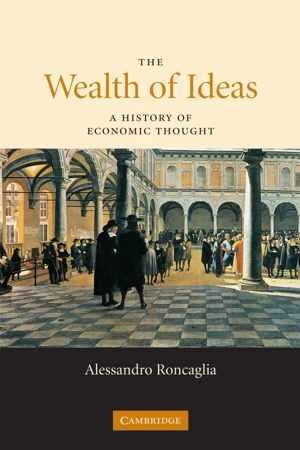The Wealth of Ideas – A History of Economic Thought

Blurb
The Wealth of Ideas traces the history of economic thought, from its prehistory (the Bible, Classical antiquity) to the present day. In this eloquently written, scientifically rigorous and well documented book, chapters on William Petty, Adam Smith, David Ricardo, Karl Marx, William Stanley Jevons, Carl Menger, Léon Walras, Alfred Marshall, John Maynard Keynes, Joseph Schumpeter and Piero Sraffa alternate with chapters on other important figures and on debates of the period. Economic thought is seen as developing between two opposite poles: a subjective one, based on the ideas of scarcity and utility, and an objective one based on the notions of physical costs and surplus. Professor Roncaglia focuses on the different views of the economy and society and on their evolution over time and critically evaluates the foundations of the scarcity-utility approach in comparison with the Classical/Keynesian approach.Book summary
In this book, Roncaglia offers a critical analysis of history of economic thought. As the author illustrates, economic thought starts long before Adam Smith and challenges the existence of a range of 'economic truths'. In his own words: In order to understand the variety of approaches within economic debate, it is necessary to reconstruct the different views that have been proposed, developed and criticised over time about the way economic systems function.
Comment from our editors:
This is an excellent introduction to critical analysis of history of economic thought, and gives the reader an holistic understanding of both the economic thought from the biggest economic thinker, as well highlighting their limitations and criticism. He writes in a clear and easy way that makes the book just as understandable for beginners as trained economists. History of economic thought helps us to understand the ideas behind the economic theories that we learn in standard economic classes, as well as a range of other ideas that are not included in a standard economic course. History of economic thought can also help students to understand the origins and underlying factors of economic ideas and policies that have shaped society as we know it. The Wealth of Ideas treats the economy in a dynamic fashion, confronted with complex, ever-changing realities.

